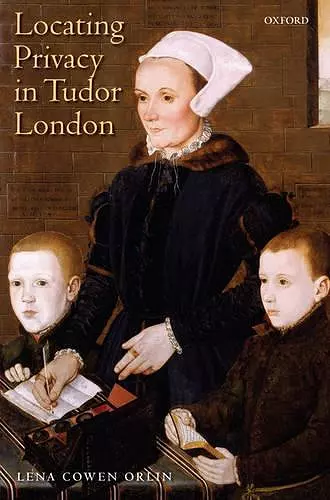Locating Privacy in Tudor London
Format:Hardback
Publisher:Oxford University Press
Published:13th Dec '07
Currently unavailable, and unfortunately no date known when it will be back
This hardback is available in another edition too:
- Paperback£53.00(9780199577385)

Locating Privacy in Tudor London asks new questions about where private life was lived in the early modern period, about where evidence of it has been preserved, and about how progressive and coherent its history can be said to have been. The Renaissance and the Reformation are generally taken to have produced significant advances in individuality, subjectivity, and interiority, especially among the elite, but this study of middling-sort culture shows privacy to have been an object of suspicion, of competing priorities, and of compulsory betrayals. The institutional archives of civic governance, livery companies, parish churches, and ecclesiastical courts reveal the degree to which society organized itself around principles of preventing privacy, as a condition of order. Also represented in the discussion are such material artefacts as domestic buildings and household furnishings, which were routinely experienced as collective and monitory agents rather than spheres of exclusivity and self-expression. In 'everyday' life, it is argued, economic motivations were of more urgent concern than the political paradigms that have usually informed our understanding of the Renaissance. Locating Privacy pursues the case study of Alice Barnham (1523-1604), a previously unknown merchant-class woman, subject of one of the earliest family group paintings from England. Her story is touched by many of the changes-in social structure, religion, the built environment, the spread of literacy, and the history of privacy-that define the sixteenth century. The book is of interest to literary, social, cultural, and architectural historians, to historians of the Reformation and of London, and to historians of gender and women's studies.
Orlin's monograph is a substantial contribution to the field of early modern studies. * Jaime Goodrich, The Sixteenth Century Journal *
Locating Privacy in Tudor London ranges over boundaries, ground plans, surveys,...wills, inventories and the "great rebuilding" of England between 1570 and 1640...Orlin pursues her subject from many directions... * Penelope Hunting, London Topographical Society *
This book is full of human stories which bring to life Tudor society in London and beyond. It illustrates with clarity how information was garnered for the prosecution of those suspected of treason, heresy, crime or immorality. * Brian Buxton, The Tyndale Society Journal *
Oxford University Press have produced an impeccable volume, with copious and beautifully reproduced illustrations; in a period when careful editing seems to be going out of fashion, even notes at the bottom of the page are a matter for congratulation... this is a book which should attract a readership beyond its apparent scholarly specialization; it is well-written and brings the past to life. * Ruth Morse, Times Literary Supplement *
Lena Cowen Orlin re-assesses the issue of privacy and concludes that far from this being the uncomplicated right of an ever-increasing number of individuals, it was a site of conflict and anxiety in Tudor England. With a mass of new primary evidence she carefully and scrupulously challenges received ideas about the 'Great Rebuilding', the nature of private space and the roles of men and women. The physical fabric of the world she examines, such as changes to domestic building, urban boundary disputes and even the role of peep-holes in the fittings of the interior, opens up new perspectives on these people's lives. A huge range of historians, those of social politics, of architecture, of representation through painting, and of the urban environment, will be gripped by this book. * Maurice Howard, Professor of Art History, University of Sussex *
Only very occasionally does a book appear that causes the reader to think about a historical period in a fresh new manner. Lena Cowen Orlin's Locating Privacy is one such text. It is beautifully written and thoroughly researched. With the interlocking chapters that present in rich detail the life of Alice Barnham, wife of draper Francis Barnham and committed Protestant and London silkwoman in her own right, with brilliant discussions of physical space and notions of privacy in the political culture of early modern England, this is a book to be celebrated. By the end of her study, Orlin has found a way to inextricably tie her two themes together, enriching them both. * Carole Levin, Willa Cather Professor of History, University of Nebraska *
Lena Orlin is one of our greatest Renaissance scholars. Her superb new book uses rich archival research to make us rethink our most fundamental assumptions about privacy, gender, and identity and to show us just how much we can know about those supposedly 'hidden from history.' * Peter Stallybrass, Walter H. and Leonore C. Annenberg Professor in the Humanities, University of Pennsylvania *
In Locating Privacy, Lena Cowen Orlin has redefined our understanding of early modern material culture, telling a story not only about objects and spaces, but also about the people who lived with and within them. Moving easily among such diverse sources as paintings, peepholes, building plans and legal records, Orlin takes us beyond Aries, Hoskins and Girouard to re-claim privacy as a central arena through which social changes were resisted, accommodated and acknowledged. A triumph of interdisciplinary studies, this is a book that will be admired by historians, literary critics, art historians and scholars of gender. * Cynthia Herrup, Professor of History and Law, University of Southern California *
ISBN: 9780199226252
Dimensions: 240mm x 160mm x 21mm
Weight: 805g
388 pages